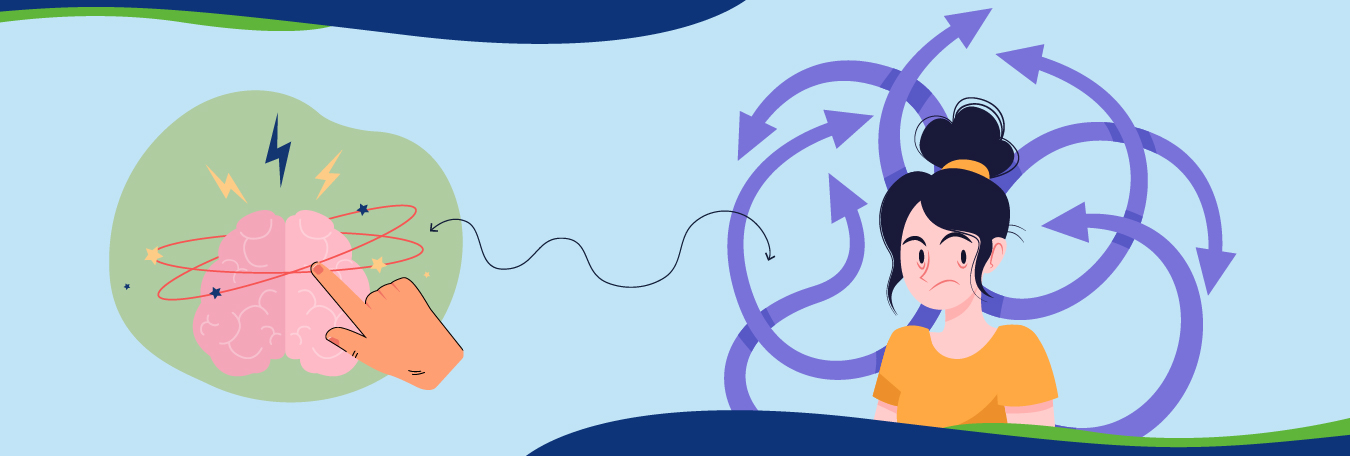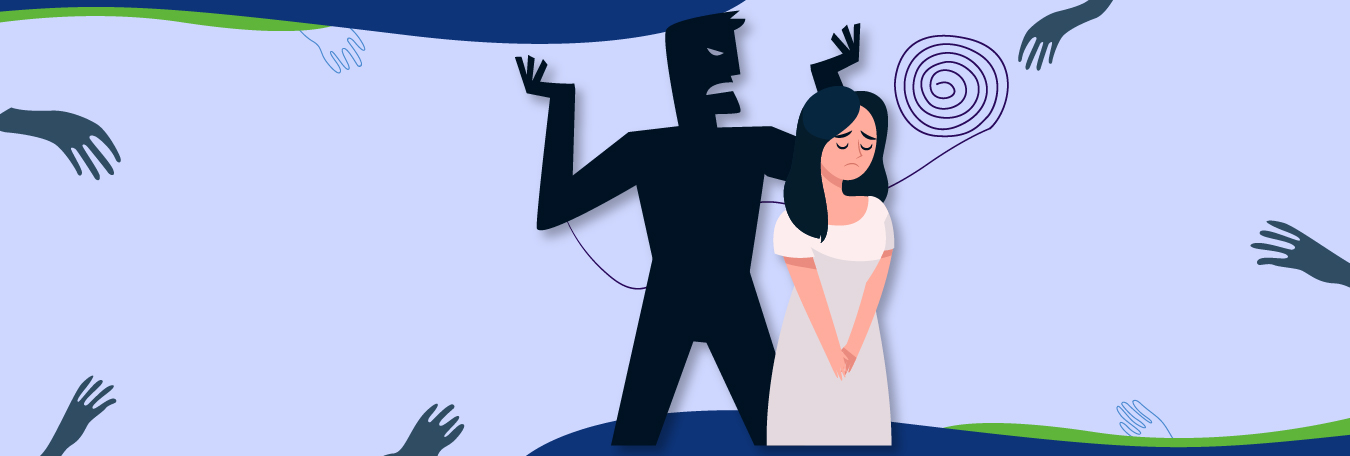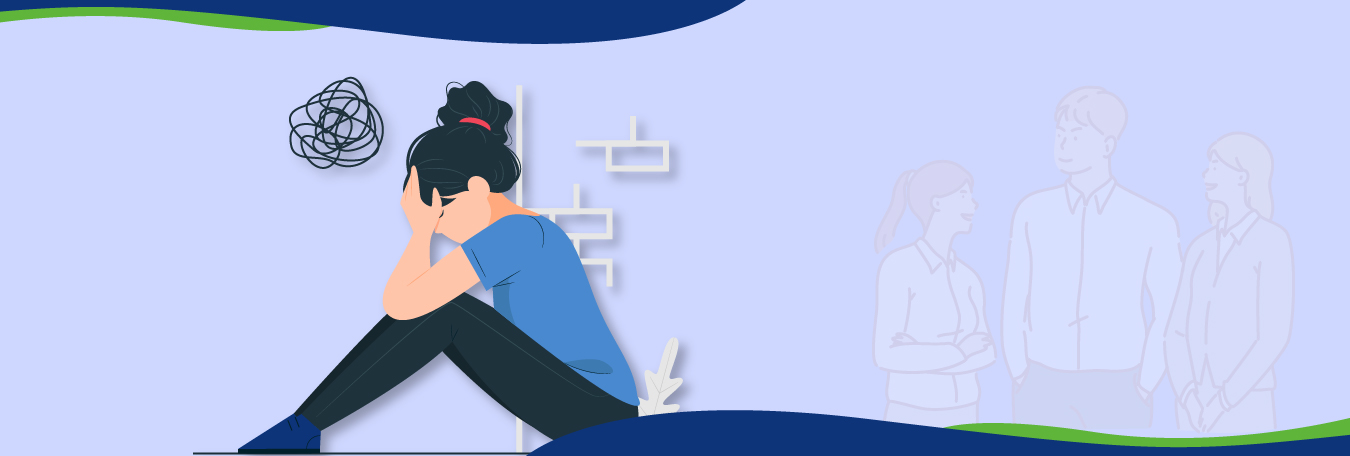Do you remember when you experienced anxiety? Do you remember being worried, tense, afraid, apprehensive, etc? Can you recall the feeling of that anxiety in your body and the worried thoughts that seem to race in your mind and can’t be shut off? Anxiety can be a traumatic and overwhelming emotion. This is true for most of us; we don’t like to feel that and will do anything to get rid of the feeling, find a way to lessen the degree, or just find a way to not pay attention to it. This article is a complete guide to understanding the association between anxiety and eating disorders and whether anxiety can lead to eating disorders or not.
What Is Anxiety?
Anxiety is described as anticipation or a feeling of fear and dread, as well as agitation. It might even make you sweat, squirm, tense, and excited, like a racing heartbeat. In addition, anxiety can be an ordinary stress reaction. For instance, you may develop anxiety when you have issues at the workplace or before an exam. That is why it can help you cope.
What Are The Common Types Of Anxiety Disorder?
There are several types of anxiety disorders, including:
Generalized anxiety disorder (GAD):
Those suffering from GAD have anxiety about ordinary issues, for example, health, finances, occupation, and family. However, their concerns are unrealistic, and they have been able to handle them nearly daily for at least six months.
Panic Disorder:
People living with panic disorder also experience panic attacks. These are sudden, repeated episodes of fear when no immediate environmental danger exists. The attacks are sudden, and the span may vary between several minutes and more.
Phobias:
Phobic individuals are usually overwhelmed by a fear that is irrational and has very little chance of being true. Their fear could be about spiders, flying, large groups of people, or, in general, public places or other social settings.
Social Anxiety Disorder:
Social anxiety disorder is also known as social phobia. It is a mental health disorder that causes fear and anxiety when a person is in social situations—people suffering from social anxiety fear being judged or watched by others.
What Are Eating Disorders?
Eating disorders are critical disorders that impact an individual’s overall health. They are issues concerning food, eating, weight, and body shape. These are such significant signs that they affect health, emotions, and functioning.
What Are The Types of Eating Disorders?
Symptoms of eating disorders vary depending on the type of eating disorder. Some of the common types of eating disorders are:
Anorexia Nervosa:
Anorexia nervosa is an eating disorder that entails severe risk to a person’s life. It involves low body weight that is clinically bad for an average individual, but a person having anorexia is fearful of gaining weight, and they have a way of perceiving weight and shape that is way off the normal. Additionally, anorexia involves an utmost effort to avoid gaining weight and achieve thinness, which tends to harm physical health and interfere with leading everyday life.
Bulimia Nervosa:
Bulimia entails episodes of purging. Many times, it also involves the intake of very little food for a long time. This often results in intensification of the urges to binge eat and then to purge.
Binge-eating Disorder:
Binge eating disorder involves overeating in a short time. Additionally, there is no control over the meal when a person is binging. But the difference lies in the absence of purging in binge eating. Eating more or in a shorter time than planned is typical behavior during a binge. Thus, even if not hungry, eating may persist up to the point of experiencing discomfort and feeling full.
Avoidant/restrictive food intake disorder:
Avoidant/restrictive food intake disorder generally encompasses minimal or no way of eating specific foods. The eating patterns of such individuals do not meet the minimum amount of nutrients needed for growth, development, and functioning in daily activities. Unlike other similar disorders, individuals with this kind of disorder do not have phobias about weight or body size.
Learn More: Types of Eating Disorders That Are More About Feelings Than Food
Anxiety And Eating Disorders: Which Comes First?
It is difficult to identify the relationship between anxiety and eating disorders fully. Additionally, it is hard to determine which condition comes first. While in some cases, anxiety might be the actual cause for the development of eating disorders, in others, it is the eating disorders that are the exact sources of anxiety.
As for anxiety, it contributes to the onset of eating disorders, which means that anxious people can develop eating disorders as coping behavior. For example, people with social anxiety disorder tend to produce some eating patterns that can help them deal with the anxiety they have. While people with general anxiety disorder can be involved in restrictive eating behaviors out of desperation, typical GADs are engaged in such behaviors to gain over their condition.
Also, eating and anxiety disorders are commonly correlated with each other since one can lead to the other. For example, an individual may be genetically prone to be anxious, and this will make them develop eating disorders like anorexia nervosa. Eventually, this restrictive eating can trigger an eating disorder coupled with the aggravation of anxiety signs.
Does Anxiety Cause Eating Disorders?
The severity of an eating disorder is considered chronic anxiety because controlling food is one of the strategies by which the sufferers seek comfort for anxiety signs. Individuals suffering from chronic anxiety tend to rely on emotional eating for their stress management. This coping behavior eventually leads to the development of eating disorders. This constant urge to utilize food to get relief from the anxiety tends to create a maladaptive cycle where anxiety is reinforced through disordered eating and vice versa. Initially, disordered eating may be used as a negative reinforcement and enable them to be relieved of anxiety for a time. However, this symptom rapidly escalates into an eating disorder, which in turn worsens the existing
Additionally, anxiety can, in the beginning, lead to weight loss. If there is a strong history of certain types of eating disorders, such as Binge-eating disorder, then this weight loss can eventually lead to the triggering of negative thoughts that increase the likelihood of recurring eating disorders.
Can Eating Disorders Be Caused by Anxiety?
Anxiety can be caused by eating disorders based on the physical damage they produce. Further, as with most eating disorders, patients get anxious as they think about weight gain and spend a great deal of time thinking about calories, exercising, or the way they look. They also have concerns about being out of control over their body or thoughts that circulate the idea of not eating healthy food. In severe conditions, Aggravated anxiety can decide almost all the choices they make concerning food.
Physically, eating disorders affect the body of a person, and this makes them develop fears of the permanent effects of eating disorders. Also, eating disorders lead to some changes in the brain’s chemical balances, which can make anxiety hard to manage.
How Common Is Anxiety Among People With Eating Disorders?
- Recent studies indicate prospective prevalence rates of comorbidity with an anxiety disorder in 24-65 percent of the sufferers.
- A significant number of people with feeding disorders are usually anxious. For example, 59% of sufferers diagnosed with ARFID (avoidant and restrictive food intake disorder) receive an anxiety disorder diagnosis simultaneously.
- Numerous recent researches show that 13.5 percent of women in treatment for an eating disorder in the United States fulfill the criteria for an anxiety disorder.
What Are The Treatments For Co-occurring Anxiety And Eating Disorders?
It is nearly impossible to treat one condition without treating the other. Both have complex but strong connections with each other. Eating disorders can contribute to the development of anxiety disorder and vice-versa. For effective recovery, both conditions need to be treated simultaneously.
Both mental health conditions have a high rate of comorbidity to the point where it is almost impossible to treat one without treating the other. Anxiety disorder and eating disorders have a bidirectional relationship and can cut across one another in their manifestation. The two are related ailments and require simultaneous treatment to attend to the patient effectively.
Psychiatric medications:
Antidepressant medications are most beneficial for people suffering from anxiety and eating disorders. It focuses on reducing anxiety, which ultimately helps the person cope with the co-occurring signs of eating disorders. There are no such medications recommended for treating eating disorders. However, numerous recent studies indicate Prozac, Norpramin, and Buspar are effective in treating binge eating disorder and bulimia nervosa.
Psychotherapy:
Therapies are considered to be the first line of treatment for both mental conditions. The main goal is to manage anxiety and help the sufferer to learn healthy coping skills to overcome stress and self-care. The most commonly used therapies are:
Cognitive Behavioral Therapy:
Anxiety and eating disorders are closely linked, and therefore, CBT helps in identifying negative thought patterns and associated unpleasant behaviors. Then, it aids in managing the anxiety and turning those unhealthy behaviors into healthy ones through various coping skills.
Dialectical Behavior Therapy:
DBT emphasizes emotional regulation through the management of overwhelming emotions that trigger anxiety or unhealthy eating habits. It also aids in teaching practical skills such as mindfulness, distress tolerance, and unhealthy communication to cope with challenges.
Interpersonal Psychotherapy:
Interpersonal Psychotherapy is a type of psychotherapy that aims to provide you with relief from signs of anxiety and eating disorders by improving interpersonal functioning. It focuses on resolving current problems and relationships rather than childhood or developmental issues.
Exposure and Response Prevention:
ERP breaks the unhealthy cycles of both anxiety and eating disorders by allowing sufferers to face the fear in a safe environment. A mental health provider will help you slowly confront feared foods, situations, or triggers related to anxiety and eating. Later on, the expert teaches the patient how to manage these behaviors or provoke anxiety healthily.
Nutritional Management
Nutritional management can help overcome the comorbid signs of anxiety and eating disorders. Moreover, a professional assesses the patient’s dietary needs, determines deficiencies, and, based on the results, develops personalized plans to promote healthy eating behaviors.
Learn More: Does Anxiety cause shortness of breath?
Stress Management Techniques:
Some of the typical stress management techniques can effectively help in overcoming the signs of anxiety and eating disorders.
- Deep breathing aids in feeling relaxed and calm from anxiety and reduces food cravings.
- Progressive Muscle Relaxation can significantly reduce tension.
- Mindfulness meditation helps in managing overwhelming emotions and food cravings.
- Regular exercise helps release endorphins that can lead to mood and reduce stress.
- Quality sleep aids in the smooth regulation of hormones, promoting good mood, reduced anxiety, and lesser hunger.
Conclusion!
Anxiety and Eating Disorders are mental health conditions that are linked to each other in some ways, with one often acting as the potential cause for the onset of the other. Moreover, anxiety can trigger the onset of eating as a coping mechanism; in contrast, eating disorders can elevate anxiety due to physical and emotional impacts. Some of the commonly experienced types of anxiety are GAD, panic disorder, and phobias, while eating disorders can range from anorexia to binge eating disorder. Effective treatment requires a better understanding and addressing of both disorders concurrently via psychiatric medications, psychotherapy, nutritional management, and lastly, stress management techniques.
If you have been lately struggling with anxiety and eating disorders and looking for a reliable mental health platform then now is the ideal time for you to choose Inland Empire Behavioral Group. We have a team of competent mental health professionals with ample knowledge about ways to treat anxiety and eating disorders. Then what are you waiting for? Get in touch with us today and experience relief from your distressing signs of anxiety and eating disorders.




